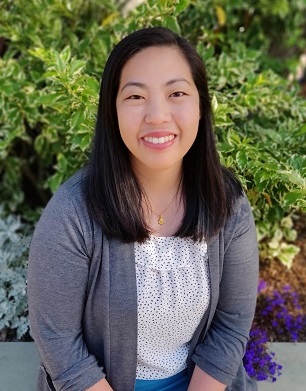Making an Impact on Children’s Learning

Grace Liau
Clinical Fellow in Speech-Language Pathology, Highline Public Schools
Growing up in Southern California, Grace Liau felt drawn to a career focused on helping kids learn. But she wasn’t sure about exactly what professional path to take.
“I majored in history at UCLA, but I also tacked on two minors — one in education and one in applied developmental psychology,” she says. “As I was considering what kind of role I wanted to have in helping children succeed academically, a few of my friends recommended I look into speech-language pathology.”
Grace started exploring the discipline, and she liked what she found.
“With speech-language pathology, you're helping people communicate, which is a critical skill for kids to develop when they're young,” Grace notes. “Communication skills are also foundational to a lot of the other skills they need in life.”
To gain the knowledge and experience required for a career in this field, Grace decided to enroll in the University of Washington’s Master of Science in Educational Speech-Language Pathology (EdSLP) program. In this Q&A, she discusses her experience in the program and how it helped her break into the field.
How did you decide on speech-language pathology as a career?
I liked that speech pathology gave me the opportunity to work with people in a more personalized way, helping them gain communication skills one step at a time. The training also opens up the possibility of working with a wide variety of clients in different settings throughout my career. This kind of career flexibility really appealed to me.
Did the program give you exposure to more than just the education field?
Yes, it’s designed to give you a solid background and training in the core skills of speech-pathology. Even though the EdSLP track was a newly established program, I knew I’d have access to the same level of courses and clinical training as the more established medical SLP program. I wanted the same rigor in my foundational courses as someone who was entering the medical setting. At the same time, I appreciated that this program is specifically set up to help its graduates succeed in a career within the educational field.
What kind of impact did the quality of the faculty have on your experience in the program?
The faculty and their vast experience were invaluable to the program. They are on the cutting edge of research in the field and possess a wide range of backgrounds, which exposed us to the different methods we could implement in our clinical work.
The clinical practicum faculty members were all amazing in how they supported my learning and my ability to interact with clients. They were willing to spend extra time to help me understand broader concepts and principles that related to my work with clients.
Can you talk about how the practicums worked?
In the EdSLP track, my first-year practicum was in the UW Speech and Hearing Clinic, where I gained individual and group experience with both pediatric and adult patients. During my second year, I was placed into three different school districts around the greater Seattle area.
I loved how the program gave me multiple opportunities to understand how speech-language pathology fits within different levels of education and observe the different approaches that school districts take to service their students. It also gave me three opportunities to be supervised by different SLPs currently working in the field.
How did this training set you up for a career in the field?
By having three different school practicum placements, I was much more prepared for my full-time job in the Highline Public Schools. The experience also helped me build a network of professionals that I could rely on for support as I began my career as a school-based SLP.
Tell us about your job.
I’m currently working in the Highline Public Schools as a speech-language pathologist. Technically, I’m a clinical fellow — that’s what you’re called in your first year out of graduate school. I’m not quite a fully licensed SLP yet, but I'm on the path to that.
I work at three different schools, and I’m loving it. I help students ages 5 to 16 communicate in a variety of ways. These range from students with articulation disorders to those who regularly use AAC (augmentative and alternative communication).
What would you say to someone who is thinking about taking this program, but unsure about making the commitment?
For me, it was worth the investment of time, energy and money to go in this direction. The program has given me the tools to make this a long-term career choice. Going into this field has allowed me to continue to pursue what I love and combine all of my different passions into one cool package.